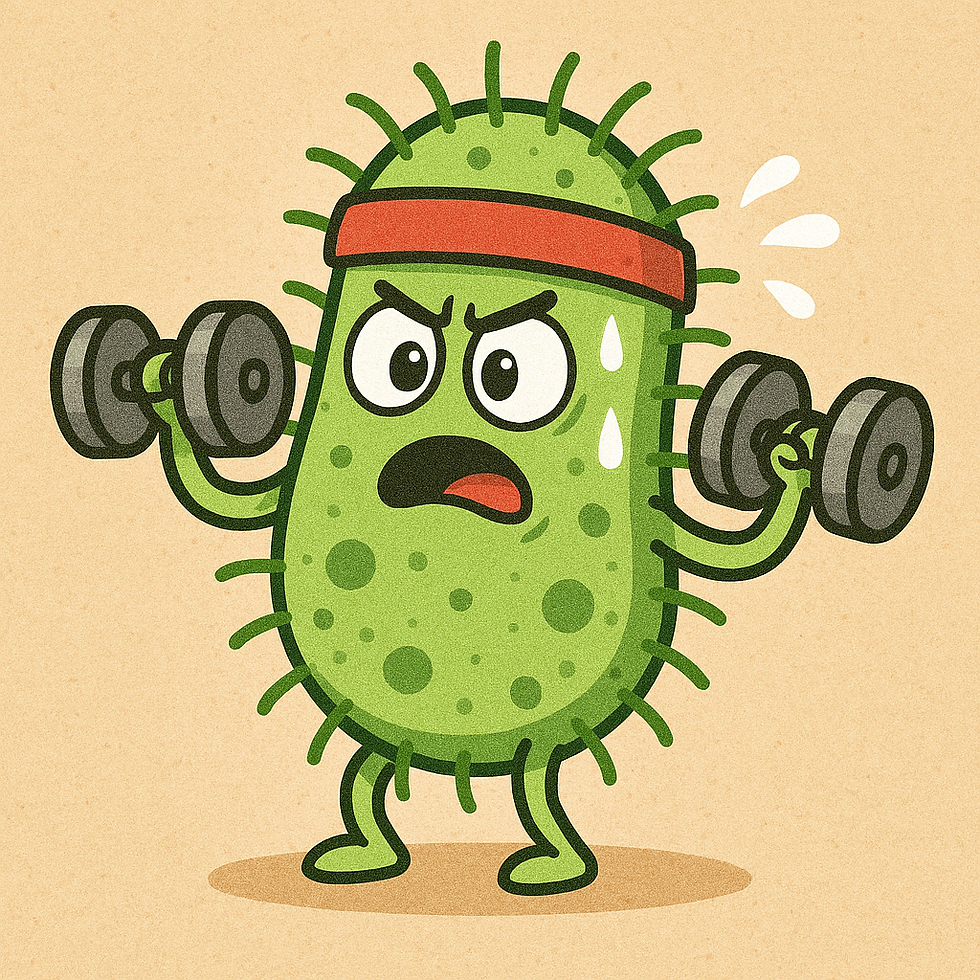The Gut Microbiome is Foundational to a Healthy Brain & Body
- Dr. Cedrick Noel

- Feb 16, 2025
- 3 min read
What Is the Microbiome?
When we talk about the microbiome, we’re referring to the vast collection of microorganisms—bacteria, fungi, archaea, viruses—that reside within and on the human body. The gut microbiome is the most extensively studied, with roughly 39 trillion bacterial cells inhabiting the digestive tract. For perspective, that’s nearly a 1:1 ratio with human cells, meaning we are as much microbial as we are human.
This ecosystem contains around 1,000 different bacterial species, though estimates vary. Some dominate, some are transient, and their genetic contribution to our physiology is enormous—microbial genes outnumber human genes by at least 150:1.
How Do We Best Support the Microbiome?
Dietary Fiber: Prebiotics like inulin, fructooligosaccharides, and resistant starch fuel beneficial bacteria, particularly species like Bifidobacterium and Lactobacillus.
Fermented Foods: Probiotic-rich foods—yogurt, kefir, sauerkraut—introduce beneficial strains and enhance microbial resilience.
Polyphenols & Short-Chain Fatty Acids (SCFAs): Found in berries, green tea, and cacao, polyphenols promote SCFA production, which supports gut barrier integrity and immune function.
Minimal Antibiotic Use: Antibiotics indiscriminately kill both pathogenic and beneficial bacteria, sometimes causing long-term dysbiosis.
Diverse Diet: Greater dietary variety equates to greater microbial diversity, which correlates with better metabolic and immune outcomes.
Circadian Synchronization: The microbiome follows circadian rhythms. Irregular eating patterns and disrupted sleep cycles can negatively affect microbial composition.
Sleep Quality: Sleep deprivation and inconsistent sleep patterns lead to disruptions in the gut microbiome, increasing inflammation and reducing microbial diversity. Studies indicate that poor sleep can alter the balance of Firmicutes and Bacteroidetes, key bacterial phyla involved in metabolic health.
Environmental Influences on the Microbiome
The gut microbiome is foundational but doesn’t exist in isolation—it’s shaped by our environment.
Major influences include:
Western vs. Traditional Diets: Processed foods, emulsifiers, and high sugar intake reduce microbial diversity, whereas traditional, fiber-rich diets promote it.
Pollution & Chemicals: Exposure to pesticides, heavy metals, and microplastics can alter microbiome composition and function.
Physical Contact & Socialization: Shared microbiomes within households and communities contribute to microbial stability.
Dietary Sensitivities: Gluten, dairy, soy, and sugar can have significant effects on microbiome health. Gluten and dairy may contribute to increased gut permeability in sensitive individuals, soy can impact hormone-regulating bacteria, and high sugar intake fuels pathogenic bacteria while depleting beneficial strains. Additionally, excess sugar consumption can contribute to an overgrowth of yeast, particularly Candida species, which may lead to dysbiosis, increased inflammation, and a range of systemic symptoms such as fatigue, brain fog, and digestive disturbances.
The Gut-Brain Axis
A bidirectional communication that strives for homeostasis but can easily fall out of alignment.
Neurotransmitter Production: Gut bacteria produce neurotransmitters like serotonin, dopamine, and GABA, which play crucial roles in mood regulation and mental health.
Vagus Nerve Connection: The vagus nerve acts as a direct line of communication between the gut and brain, transmitting microbial signals that can impact stress response and cognitive function.
Inflammation & Mental Health: Dysbiosis, or microbial imbalance, has been linked to increased gut permeability and systemic inflammation, which are associated with conditions like anxiety, depression, and neurodegenerative diseases.
Short-Chain Fatty Acids (SCFAs): Produced by gut bacteria, SCFAs like butyrate help maintain the integrity of the blood-brain barrier and reduce neuroinflammation.
The gut microbiome is foundational and intricate, dynamic system, influencing everything from digestion to immune function and even brain health. The best way to nurture it? Eat a diverse, fiber-rich diet, minimize unnecessary antibiotic use, stay in sync with your circadian rhythm, prioritize sleep, and engage with nature.



Comments